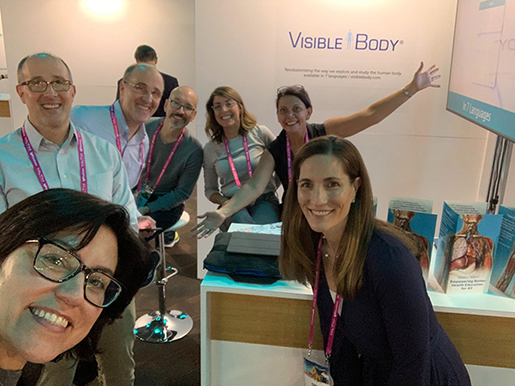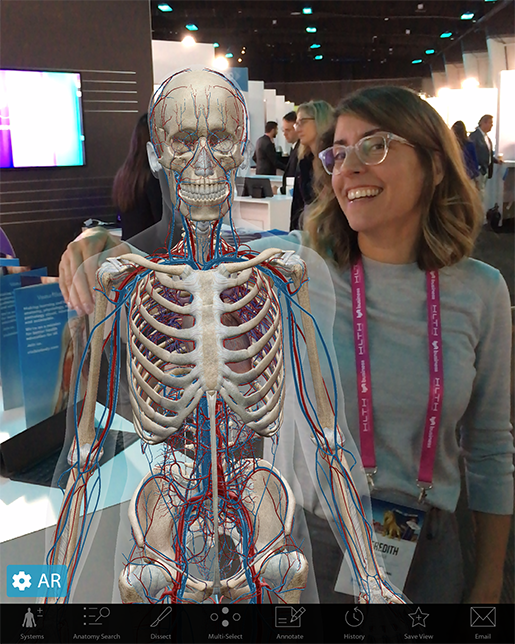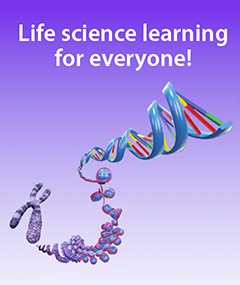7 Healthcare Industry Trends Spotted at HLTH 2019
Posted on 11/26/19 by Maite Suarez-Rivas
Every week we hear from hundreds of healthcare instructors and students about what they need to succeed with their teaching and learning goals, and at Visible Body we provide virtual anatomy technology and content to help them reach those goals. At the end of October, the VB Team attended the HLTH 2019 conference in Las Vegas and the topic on everyone’s mind was how healthcare companies—big hospitals and insurers, small startups, and community based nonprofits—are listening to customers and the innovations they’re creating to expand and improve care.

Some Visible Body team members attended the HTLH conference to show off our latest virtual anatomy content.
Here are seven industry trends that are changing how patients receive care:
Start-ups and community organizations are tackling the growth and high cost of chronic conditions
A great example is type 2 diabetes. About 26 million Americans have diabetes and another 79 million are prediabetic; globally, type 2 diabetes is fast approaching epidemic proportions.
The fast-growing, three-year old start-up Livongo works with diabetes patients to pair glucose monitoring with online app-based coaching through a certified diabetes educator. The goal is more adherence that leads to better outcomes.
The YMCA is providing preventive integrated health programs that many insurers are covering. Katie Adamson, the Y’s Vice President of Health Partnerships and Policy, spoke at HLTH about the evidence-based and very successful YMCA Diabetes Prevention Program. The goal is weight reduction and increasing exercise activity.
Telemedicine is on the cusp of a big boom
If you haven’t tried a doctor visit over the web, you’re not alone. In one poll, fewer than 20% of respondents had tried it, but most of those polled reported an interest in trying it. You might try it sooner rather than later: over 75% of U.S. hospitals already offer some form of telemedicine service. Medicare and Medicaid cover a number of telemedicine services and 34 states have laws requiring private insurers to recognize a telehealth visit like an in-person visit.
At HLTH, J.D. Power presented the highlights from their U.S. Telehealth Satisfaction Study with over eight thousand telehealth consumers. Here are some of the takeaways from that survey.
When it comes to health data, more access is just as challenging as more privacy
Evidation has worked with companies like Lilly to partner consumers interested in participating in studies with healthcare companies for innovations that improve care. Evidation’s software collects data from participating devices such as sleep monitors, as well as phones and watches that collect activity data. Who owns this data? How much of it remains personal and how much of it can be used to fuel innovation? Patients should take the lead, argues Evidation’s CEO. It’s their data. It needs to be accessible to them and they should be asked about who sees it and what is done with it.
Artificial intelligence combined with machine learning is being used to enhance care
Patients don’t want to replace their doctor with a machine, but how about if you could “talk” to someone at 2 a.m. about your health?
Lark Health was founded by Julia Hu, who grew up with a chronic disease. She considers the good management of her chronic disease the result of constant support and engagement. The conversational artificial intelligence platform at Lark can help with chronic conditions including hypertension and diabetes. It’s used by over a million patients to manage chronic disease and the company works with some of the largest payers and self-insured employers in the country to achieve better health outcomes.
Companies are using everyday technology to bring your healthcare outcomes directly to you
So many companies are looking to bring the Uber-like transformation of transportation to healthcare. Here are a few examples we saw at HLTH:
- The Hims and Hers platforms allow patients to be screened online by a physician and order prescriptions to treat common conditions.
- One could have a medical-grade EKG done anytime and anywhere with Alivecor’s app.
- Lyra is trying to make it easier for companies and their employees to access mental and emotional care services.
- About 30% of the global population suffers from one or more symptoms of insomnia, but most don’t have the time to sign up for a study at a sleep diagnostic clinic. FusionHealth is combining “specialty sleep medical care, cognitive behavioral-based coaching, and technology-enabled sleep solutions” with Sleep Charge, a virtual sleep lab.
Increasing diversity is an initiative that benefits the community at large
At a general session on the importance of diversity, Helen Leis of Oliver Wyman highlighted the results of the 2019 Women in Healthcare Leadership Survey done in collaboration with the HLTH conference.
Currently, women make up over 60% of the healthcare workforce; but when you get to the level of leadership positions, only 30% of C-suite teams include a woman and just 13% percent of CEOs in the healthcare industry are women.
How does diversity impact decision-making? Here are some stats straight from Helen Leis’ talk:
- Companies with more women in executive positions have a 34% higher return to shareholders than those that do not.
- Decisions made and executed by diverse teams deliver 60% better results.
- Diverse teams are 58% less likely to make financial errors compared to homogeneous groups.
Our emotions can impact the way we tackle health challenges
Having a great patient-provider relationship is just as fruitful as a great student-teacher relationship...it improves outcomes! When people feel heard, they feel enabled, a truth shared by the mom of Kodi Lee—a blind and autistic young man, who performed for the five thousand attendees at the HLTH 2019 conference and brought everyone to tears and cheers.
So what’s the goal of all these innovations? An inspiring interest in expanding healthcare access and providing the kind of information and education that gives people agency to make better choices about their health!
 Teammate Meredith and our beloved Paul at HLTH.
Teammate Meredith and our beloved Paul at HLTH.



